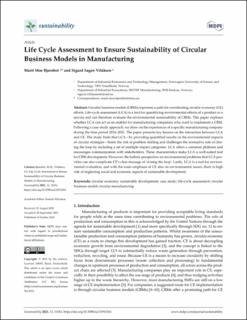Life Cycle Assessment to Ensure Sustainability of Circular Business Models in Manufacturing
Peer reviewed, Journal article
Published version

Åpne
Permanent lenke
https://hdl.handle.net/11250/2789464Utgivelsesdato
2021Metadata
Vis full innførselSamlinger
Originalversjon
10.3390/su131911014Sammendrag
Circular business models (CBMs) represent a path for coordinating circular economy (CE) efforts. Life-cycle assessment (LCA) is a tool for quantifying environmental effects of a product or a service and can therefore evaluate the environmental sustainability of CBMs. This paper explores whether LCA can act as an enabler for manufacturing companies who want to implement a CBM. Following a case-study approach, we draw on the experiences of a specific manufacturing company during the time period 2014–2021. The paper presents key lessons on the interaction between LCA and CE. The study finds that LCA—by providing quantified results on the environmental impacts of circular strategies—limits the risk of problem shifting and challenges the normative rule of closing the loop by including a set of multiple impact categories. LCA offers a common platform and encourages communication with stakeholders. These characteristics make LCA a well-suited tool for CBM development. However, the holistic perspective on environmental problems that LCA provides can also complicate CE’s clear message of ‘closing the loop’. Lastly, LCA is a tool for environmental evaluation, and with the main emphasis of CE also on environmental issues, there is high risk of neglecting social and economic aspects of sustainable development.
